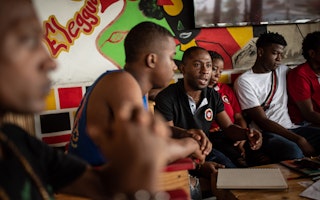Venezuela’s “Firefly” Aims to Illuminate News that Others Won’t
By Marius Dragomir
Laura Weffer is a feisty journalist who has been upsetting Venezuelan governments for more than a decade now. Back in 2002, she challenged the embattled president Hugo Chavez in a news conference, asking him whether he felt any remorse for inciting violence against journalists.
Mobs had beaten journalists in the street in Caracas, the capital city. A newspaper office had been bombed. But Chavez, glossing over all that, asked Weffer to show him a beaten journalist. She pointed to her punched cheek. Chavez replied dryly that he had no answer to her question.
Since then, Weffer has incessantly monitored governments, politicians, and businesses for foul play. She defies threats, publishes incendiary investigations, and slams the authorities for human rights abuses.
But last year, one of her investigations into street protests in Caracas was spiked by the editors of Ultimas Noticias, the country’s bestselling newspaper. With most of the country’s media taken over by government cronies, Weffer realized that censorship was likely to intensify. She decided to go her own way. Like many of her peers, she went online.
“One of the hardest things in launching this start-up was finding a name,” she says. “We wanted to transmit the idea of light because of the darkness of information that surrounds us in Venezuela. We wanted to transmit as well the idea of socializing, of networking, because many people in Venezuela feel isolated.”
The chosen name was Efecto Cocuyo (Firefly Effect). “One cocuyo can’t make a difference, but if you take two, three, five cocuyos, then you can see the light,” she said.
Launched in the spring of 2015, Efecto Cocuyo was cofounded by Weffer and Luz Mely Reyes, another valiant investigative journalist. It is run by a team of six journalists, editors, and a fundraiser. A crowdfunding campaign raised over US$14,000. The website has attracted 43,000 followers on Twitter and 3,000 on Facebook.
And it continues to make waves.
This is not surprising in a poverty-stricken country where most media outlets are controlled by the government or its cronies. “Traditional media had some room to maneuver in the past and could write good or bad things about the government,” Weffer explains. “But after the hostile takeover of these media by the government or people close to the government, their independence ended. A big proportion of the information that citizens receive comes from government, and most of it is propaganda.”
Venezuela ranked 137th out of 180 nations in the 2015 World Press Freedom Index put out by Reporters Without Frontiers (RSF), a global media freedom NGO. That was a massive decline from its 116th rating a year before. RSF and other watchdogs have repeatedly rebuked Venezuela for the dismal state of its media pluralism.
Globovision, a mainstream television station that used to support opposition, is now owned by businessmen who also own insurance companies and are known to be close to the government. El Universal, Venezuela’s oldest daily, also known for its critical journalism, was bought last year by a Spanish group, Epalisticia, with close ties to the government. The ownership of many other major outlets that openly support the government is a mystery.
Part of Efecto Cocuyo’s mission is to act as a counterbalance to these outlets.
“We offer three distinctive things,” says Weffer. “First, we try to humanize the news. We are used to reading that someone has been killed and leaves two children, orphans. We try to find the family and let them tell their story. Second, we keep communicating with our readers. Third, we give context to news.
“The situation in Venezuela is very complicated and confusing. We try to answer the questions about current events that are on every Venezuelan’s mind.”
If the government does not stop them, however, funding problems may. Only diversified sources of cash can keep the firefly airborne, Weffer said. She and her team are in talks with private donors. They struck deals to produce content for several (still) independent television channels. And they plan to organize events such as summer schools for journalists for which they will charge a fee.
But crowdfunding will remain the funding pillar for some time, because it keeps people interested and attached. On a January morning this year, Weffer and Reyes went to Petare, one of the poorest districts in Caracas, with empty buckets, asking for money from locals. To their awe, every single person they met contributed a sprinkling of bolivares.
“People feel that they fight government propaganda by funding us,” Weffer said. “What we don’t want to do is sell advertising unless we really have to.”
With its internet penetration rising fast and an information-hungry audience, Efecto Cocuyo is likely to garner solid readership. Some 60 percent of the population, or almost 16 million Venezuelans, were online last year.
Weffer wants to unite all journalists who, facing threats and pressures from government, have migrated in the past few years from traditional media to internet start-ups. “We haven't been threatened so far because we’re at the very beginning,” she said. “The government is under a lot of stress from other sectors and hasn’t paid much attention to us. But we know that is coming. We are trying to build an alliance of media start-ups to be able to defend ourselves when the danger comes. That is the only thing that we can do.
“We don’t know when they strike. So we have to be prepared.”
Given Venezuela’s recent history, this is a wise precaution.
Until August 2016, Marius Dragomir was senior manager and publications editor with the Open Society Program on Independent Journalism.


